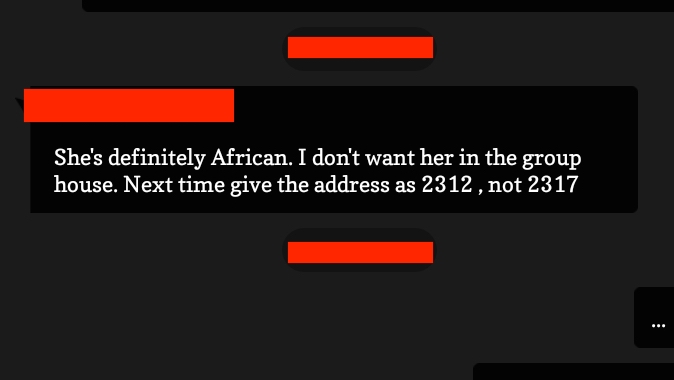“She’s definitely African”: One Person’s Experience with Housing Discrimination
By Nick Adjami
February 27, 2020
“She’s definitely African. I don’t want her in the group house. Next time give the address as 2312, not 2317.”
That was the text message Jennifer* received from a landlord operating in Northern Virginia. Jennifer found a property listed for rent on Craigslist and reached out to get more information. She ended up in a group chat with the landlord and a current tenant of the home. While she attempted to schedule a viewing of the unit, the tenant asked her if she was a citizen, and she responded affirmatively. Then, the landlord interjected with the above message, likely intending to only send the message to the current tenant, and not this potential renter.

Jennifer, a U.S. citizen of Bahamian descent, was stunned. She had been excited about the property. It was affordable and offered a convenient commute to a nearby college where she planned to take classes. This landlord’s racist refusal to rent to her left her shaken and distraught. “It reminded me of all the times I have experienced racism growing up where I was told that I wasn’t welcome here because I’m Black,” Jennifer told us.
Under the federal Fair Housing Act (FHA), it is illegal to discriminate in housing based on race, color, or national origin, in addition to four other protected classes. Unfortunately, over 50 years after the passage of the FHA, such discrimination still occurs. In 2018 alone, 8,200 fair housing complaints were filed alleging discrimination based on race or national origin, and many more instances went unreported. It is worth noting that the FHA’s protections apply not only to members of the law’s protected classes but also to anyone perceived to be a member, as in this case.
The Equal Rights Center is here to assist individuals, like Jennifer, who have experienced housing discrimination. We helped Jennifer file a complaint with the Virginia Fair Housing Office and supported her throughout the process. On December 4, 2019, the Virginia Fair Housing Board informed us that it had found reasonable cause to believe that this landlord had illegally discriminated against Jennifer. The next step was to engage in conciliation, a process by which the complainant, respondent, and Virginia Fair Housing Office would come together and attempt to reach a settlement agreement. The landlord refused to participate in this process.
On Monday, February 24, 2020, the Virginia Fair Housing Board released an official charge of discrimination against the landlord, and the Virginia Attorney General’s Office will soon file Jennifer’s case in court, but unfortunately much damage has already been done. The housing search that led her to this landlord’s listing was a critical and time-sensitive endeavor. At the time, she was living in a house that lacked heating or A/C. She also had difficulty breathing due to a combination of paint fumes from the landlord’s repainting of the home and the feces of his eleven cats. Jennifer had recently undergone surgery, and she found it impossible to recover in the inhabitable conditions of her home.
After this new landlord refused to rent to her, Jennifer continued her search for housing, but she was unable to identify any other affordable units in the area. As a result, she became homeless and has been staying in emergency shelters and transitional housing for over a year now. Last spring Jennifer enrolled in classes at Northern Virginia Community College, but ultimately could not complete the semester. She had no stable place to study or sleep, and her commute of over an hour by bus and metro exhausted her. Had she been able to rent the unit listed in the Craigslist ad, she would have lived less than six miles from campus, and would not have had to take all of her belongings with her every day. Finally, her mental health suffered as a direct result of this landlord’s discrimination against her.
While we work to secure justice for this woman, we know that the consequences of discrimination are severe and impossible to erase. As Jennifer phrased it, “[this landlord] likely spent only a few seconds sending that text message, telling me I couldn’t apply at his property because he thought I was African. Yet those few seconds have dramatically impacted my last year. His racist assumptions about my desirability as a tenant resulted in me experiencing homelessness, to leave school before I could complete my associate’s degree and it has deeply hurt me emotionally. While he may be able to sleep well at night, I can’t.”
The Fair Housing Act strives to ensure equal opportunity in housing for all, but this is only possible with strict compliance and rigorous enforcement of the law. Too often, landlords discriminate and break the law. Discrimination of any sort is simply unacceptable, and as evidenced by Jennifer’s case, can have devastating consequences. The Equal Rights Center remains committed to supporting victims of discrimination and promoting fair housing.
*Names have been changed to protect the identity of the person in this story.
Update: in 2019, ERC staff helped Jennifer to file a discrimination complaint with the Virginia Fair Housing Office and supported her through the process. The Virginia Fair Housing Board “found reasonable cause to believe discrimination occurred” and the case was referred to the Virginia Office of the Attorney General (OAG). The OAG filed suit against the landlord in court and in 2022 secured a default judgement against him. A judge for the Circuit Court of Arlington County ruled: “Plaintiff has proven that the Defendant discriminated against [Jennifer] on the basis of her race and/or national origin and/or ethnicity by denying her housing,” and ordered the landlord to pay Jennifer $20,000 in compensatory damages.
———
If you believe you may have experienced discrimination in housing, you can contact the Equal Rights Center. To report your experience, please call 202-234-3062 or email info@equalrightscenter.org.

